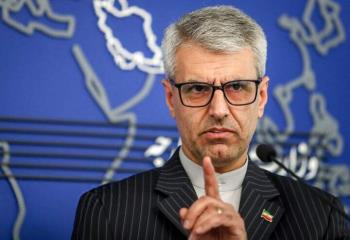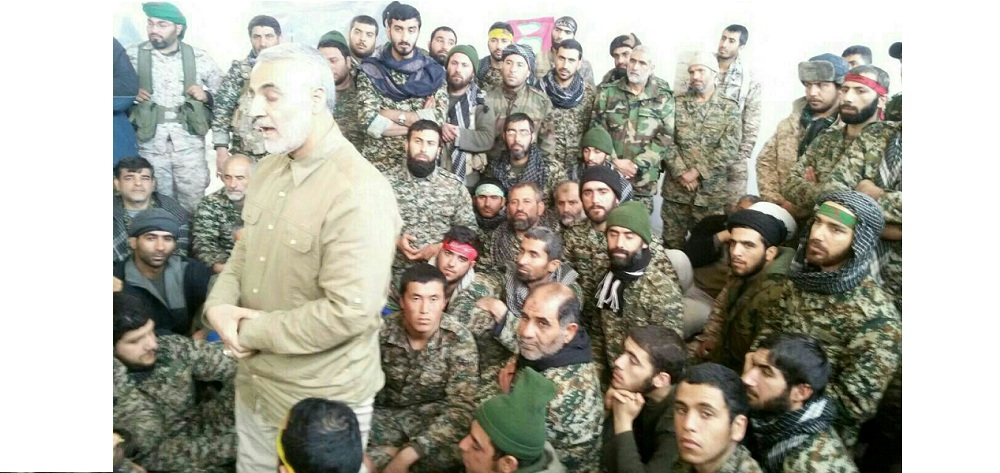Alwaght- When in January 2020, the US military assassinated Iran’s top anti-terror General Qassem Soleimani with a direct order from Donald Trump, the Western capitals and Tel Aviv went jubilant, thinking that they eliminated the biggest obstacle of implementation of Western-Israeli plots in the region and from now on, they can easily advance their evil plans. But after three years from this crime, the commemorations for him and his assassinated comrades suggest that General Soleimani’s thought and path are still alive and moving forward. As time goes by, his sacrifices and fight against the Western-nurtured terrorists would be disclosed and many thinkers talk and write about his commanding role in the region.
Alwaght arranged an interview with Jaafar Qanadbashi, discussing with him the effects the resistance and sacrifice model General Soleimani left on the regional nations.
Alwaght: Three years have gone since General Soleimani assassination, but when his sacrifices are remembered, the Westerners and their media still censor his news and still propagate and produce programs against this genuine hero to affect the positive popular view on him. But this wound remains warm for the Axis of Resistance and the people in the region who call for his revenge. What is the secret of his name’s survival?
Qanadbashi: Two features make his name survive. One is his personal character. One of his characteristics is that he was an outstanding man in terms of human traits and qualities and in a way a perfect man with a pure nature. He did not care about material things. General Soleimani was so pious that he did not see human faults, he looked at people beyond their ethnicity, race, and language, and his level of vision was beyond human affiliations and categories. It is said that he who purifies and corrects his relationship with the God, corrects his relationship with the people, too. His character was a translation of this saying. Mystical and spiritual vision in that person created traits that people loved. The presence of thousands of people on his tomb in his hometown of Kerman even in the cold of winter is driven by these unique characteristics that he had. Even in Iraq, Lebanon, and Syria, where the third anniversary of this commander is marked, there are spectacular scenes of his popularity among the people.
The secret of his memory’s stay among people lies in the fact that he was the voice of the oppressed in the region. The Muslims in Iraq, Syria, Lebanon, and Iran need somebody who honestly and without show-off counters a colonization that has been overshadowing the region for two centuries and General Soleimani was an obvious example of such a man.
Alwaght: What were General Soleimani’s obvious characteristics in terms of operational and strategic command? And what made him have these two characteristics together?
Qanadbashi: General Soleimani did not copy Western and imported models in general and constantly was seeking to respond to Iranian military and operational needs. He scrapped all of the Western models that were designed to cause dependence and some command protocols that shaped the defense basis of military so that other countries develop no domestic and independent power and remain dependent to the West. General Soleimani put aside all of these imported models and this was the starting point of the country’s independence. In other words, Iran was distanced from its independence when under Qajar dynesty its military training was entrusted to the foreigners and wars made Iran dependent on the foreign forces.
The starting point for us is to check our own strategic needs from scratch and put it into action. This era started by General Soleimani. The outcome of this work was that the military power of Iran’s armed forces was not built based on the dependence and purchase of weapons from abroad. This program ended the part foreign arms purchases played in the Iranian military strategy and this meant blocking colonization’s sway over our country.
The highest profits that colonial countries make is through the sale of weapons to other countries, and General Soleimani used methods that were beneficial to our country in the field of defense, but were not based on foreign weapons, and this made a general change in the region, arousing the ire of the Westerners. It is said that some arms companies assisted the assassination of General Soleimani as they saw him as a big obstacle to their profits. With the model he presented, the general invalidated the myth of the role of Western weapons in regional protection. He did not even use foreign advisers to develop his defense model. There are countries in the region that use Western weapons and buy billions of dollars in Western weapons every year but their defense capabilities to ensure their national security and interests are at the lowest level.
General Soleimani presented a grand theory in the framework of collective security. Nowadays, the defense of national interests is not defined within the boundaries of a country, and actually defense must inevitably be cross-border. Collective security and defense means defending the national interests of each and every member that is in this framework, as well as increasing their military capacity, which means that Iran uses the achievements and capacities of allied countries and provides its capabilities to them to defend their national interests. This is the highest type of defense of national interests and General Soleimani made a lot of efforts in this area and brought independence in the military field to the country. This issue has also caused changes to the region. Now in Iraq and Syria, the governments are trying not to use western weapons and rely on domestic power, and even in Saudi Arabia, the purchase of Western advanced weapons has decreased as Riyadh rulers are increasingly understanding that what protects national interests and security is not foreign arms purchases.
Alwaght: What was General Soleimani’s role in the Muslim world rise and particularly the Palestinian developments? After all he was a supporter of the Palestinian resistance and Palestinian leaders have repeatedly admitted his backing to the resistance groups.
Qanadbashi: The first role that General Soleimani played in the region which shook the entire region and was the starting point of the strengthening of the Axis Resistance was the implementation of a successful model against the Israeli regime in the 33-day war. In that war, General Soleimani implemented a new model of resistance with the help of Emad Mughniyeh, one of the former commanders of Hezbollah and Sayyed Hassan Nasrallah, the secretary general of this movement. In the 33-day war, he invalidated the myth of the invincibility of the Israeli regime that existed among the countries of the region for several decades. The fact that a small number of Hezbollah forces in southern Lebanon managed to inflict a heavy defeat on the Israeli enemy without relying on foreign countries caused a shock within Israel’s borders. After the defeat of the Israeli regime in this war, Prime Minister Ehud Olmert and defense minister were put on trial for the scandalous military drawbacks.
After the defeat of the occupiers, there appeared a belief among the Palestinians that Israel could be defeated, and if we see the very small Gaza won repeated wars against Tel Aviv is because of adopting the 33-day war model, and this was the most important job of General Soleimani.
Of course, General Soleimani also played an important role in the military arrangements and the use of popular forces, and those who participated in the war in Lebanon were militia groups. In the past, there was this idea that there should be people in the war against the Israeli regime who were troops themselves and had received the necessary training, and popular forces were not used. This idea was adopted in Palestine and only professionals were used for war. In Lebanon, what happened was that popular militia forces appeared on the battle fronts, and therefore the idea arose that the war could be won by using the power of the popular forces, and this model was established by General Soleimani.
The same method is being implemented in Palestine, and now all people, even children, are participating in operations against the Israeli regime. Indeed, in the delivery of weapons to the Palestinian groups, effective measures were taken under General Soleimani, but it required secrecy, as in Lebanon this plan had well been implemented without taking attention of the enemy and satellites. In today’s wars, it is difficult to hide the transfer of weapons due to the technological advancements in the field of satellites and the use of advanced radars, and if people do not help, there would be problems. General Soleimani was successful in this area, too.
Alwaght: Trump and the Americans sought to undermine the Axis of Resistance by assassinating General Soleimani. Have they realized this goal? Has the general’s command vacuum affected the Axis of Resistance?
Qanadbashi: The Americans’ view of Axis of Resistance was the same as the criminal groups that depend on an individual, and if this individual is removed, the group will disintegrate. They had an idea of General Soleimani as a great commander in the absence of whom many problems could arise in the body his forces. According to this perception, the resistance forces are like the militias that were active around the world during the Cold War and were dependent on the power of the commander. In other words, the Americans thought that if the general is assassinated, the Resistance camp would collapse.
The Americans were unaware of the fact that General Soleimani, in addition to commanding the resistance forces, simultaneously trained many people like him, and apart from the military aspect, he was also active in the human resources aspect and created motives in these forces. He not only trained his own forces but also created new motivations in Lebanon, Syria and Iraq forces and destroyed the misconceptions that they cannot take military action without the help of the West.
Destroying these misconceptions paved the way for growth of the resistance outright. He created the notion that these forces can stand up in the face of big powers and defeat them. What happened in Syria was a world war in which the resistance forces under the command of General Soleimani won, and one of his successes was to create a belief to build other Soleimanis. Therefore, with his assassination, no command vacuum emerged among the resistance forces, and the big sign is the extreme worries of the Israeli regime which at the same time regularly threatens the resistance, and these threats are because the Axis of Resistance has not disappeared. If the resistance had been weakened, there would be no reason for so much worry and they could have taken measures against these forces, but they are unable to do so. This proves that despite General Soleimani’s absence, he had already managed to materialize and propagate his thoughts among the resistance forces for them to continue the struggle path in his absence.



























